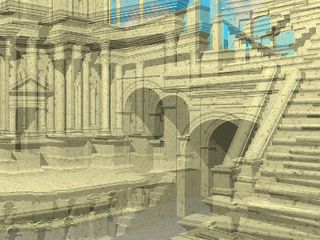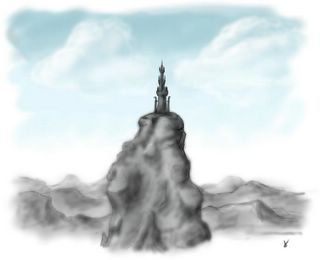
There is an overlap of pictures in this image. Both are real but one does not overcome the other in terms of being the "true" picture. My visual sense can focus mostly on one over the other but not completely. The overlap causes this visual conflict.
My recent study of the various interpretations of the kingdom of God brought me to this picture. In many ways, the Christian life is lived in this type of overlap. The overlap is not visual but, instead, encompasses all the person - heart, mind, strength.
The kingdom of God is referenced in two groups of sayings. On the one hand, Jesus message in the Gospels points to an imminent future apocalyptic expectation in Jesus' message (Mk 1:14-15; Mk 9:1; Mk 14:25; Mk 6:10). On the other hand, some sayings point to the kingdom as a present reality or experience in the world (Mk 4:1-33; Mt 11:2-6; Mt 12:28; Mt 13:16-17; Lk 17:20-21).
The tension between these two groups of sayings has led to various theories about the kingdom. 1. Jesus is viewed as an eschatological prophet who (like his contemporaries) expected and proclaimed the Kingdom as an imminent, eschatological event.
2. The 'present' or 'realized' sayings are authentic while the 'future' or 'apocalyptic' syaings are secondary.
3. Jesus was an eschatological prophet who proclaimed that the kingdom of God had been inaugurated in his person and ministry, but with a dramatic consummation in the future. (theories given in my Gospel of Mark class last spring).
The third provides a balance approach that holds the sayings in tension as we live in the overlap of the ages between the 'already' (Jesus' coming, death, resurrection, ascension, exaltation) and the 'not yet' (Jesus' return in power). I believe that the reign of God (kingdom of God) that is present in this overlap of the ages is real but often rejected in favor of a this-world ("realized") focus or other-world (future kingdom) focus.
What do we miss by assuming that this world is all that there is? What do we miss by assuming that God will not reign until Christ's return? We miss the present reign of God where the Spirit has been given and Christ reigns at the right hand of the Father now.
Paul attempts to answer this in light of his urging of the Roman church to offer their bodies as living sacrifices. The "renewal of the mind" of Romans 12:2 is a renewal toward seeing God's present reign as we wait patiently for Christ's return. We must not sleep because our salvation is closer than when we first believed (Romans 13:11-14)... Am I watching? Or do I think that I am left to my own devices to create the kingdom by human hands or do I think that this world is "going down" so I should bury my head waiting for Christ's return?
I'd rather watch and act "decently as those who live in the day" in service of God and others.



